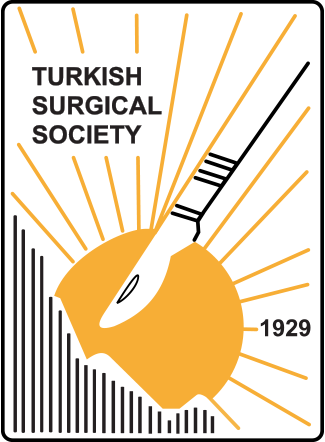Abstract
Purpose: To determine symptomatic hypocalcemia after total thyroidectomy at an earlier stage by measuring rapid parathormone (rPTH) levels perioperatively.
Material and Method: A prospective study was designed with 54 patients who were planned to undergo a bilateral total thyroidectomy for multinodular goiter, follicular neoplasms and differentiated thyroid cancer. The rPTH levels were determined preoperatively on the operating table before the induction of anesthesia, postoperatively in the recovery room and following surgery. The serum calcium leves were determined preoperatively, postoperatively at 8th and 24th hours following surgery.
Results: Four patients were excluded from the study. Hypocalcemia developed in eight patients (16%), six (12%) of them were symptomatic, whereas two of them (4%) were asymptomatic. rPTH levels below 12pg/ml (n:12-55 pg/ml) postoperatively were found to be 100% sensitive and 95% specific in early diagnosis of symptomatic hypocalcemia following total thyroidectomy. A decrease of rPTH >75% between pre- and postoperative levels of PTH was found to be 100% sensitive and 97% specific in early diagnosis of symptomatic hypocalcemia following total thyroidectomy, having a positive predictive value of 75% and 85%, respectively. The difference between rPTH levels measured postoperatively in the recovery room and at 24th hours following surgery was statistically not significant (p>0,05).
Conclusion: rPTH measurement in the recovery room is a safe and effective method in early diagnosis of symptomatic hypocalcemia following total thyroidectomy. It enables to discharge patients safely at an earlier time and to initialize a therapy fot these patients who might need a calcium replacement therapy.
Keywords:
Symptomatic hypocalcemia, rapid parathormone, total thyroidectomy
References
1Fewins J, Simpson CB, Miller FR. Complications of thyroid and parathyroid surgery. Otolaryngol Clin North Am, 2003; 36: 189-206
2Assenza M, Ricci G, Romagnoli F, et al. Thyroid surgery: total and partial resection. Analysis of complications and a review of the literature. Chir Ital, 200; 56: 371-82. 3 Pattou F, Combemale F, Fabre S, et al. Hypocalcemia following thyroid surgery: incidence and prediction of outcome. World J Surg, 1998; 22: 718-24.
3Wong C, Price S, Scott-Coombes D. Hypocalcaemia and Parathyroid Hormone Assay Following Total Thyroidectomy: Predicting the Future. World J Surg, 2006; 30: 825-832
4Milone A, Carditello A, Stilo F, et al. Hypoparathyroidism risk after total thyroidectomy. Chir Ital. 2004; 56: 617-20.
5Nahas ZS, Farrag TY, Lin FR, et al. A safe and cost-effective short hospital stay protocol to identify patients at low risk for the development of significant hypocalcemia after total thyroidectomy. Laryngoscope, 2006; 116: 906-9.
6Adams J,Andersen P,Everts E,et al. Early postoperative calcium levels as predictors of hypocalcemia. Laryngoscope, 1998; 1829-1831.
7Husein M,Hier MP,Al-Abdulhadi K,et al. Predicting calcium status postthyroidectomy with early calcium levels. Otolaryngol Head Neck Surg, 2002; 289-293.
8Lindblom P, Westerdahl J. Low parathyroid hormone levels after thyroid surgery: A feasible predictor of hypocalcemia. Surgery, 2002;515-520.
9Lo CY,Luk JM,Tam SC. Applicability of intraoperative parathyroid hormone assay during thyroidectomy. Ann Surg, 2002; 64-569.
10Richards ML,Bingener-Casey J,Pierce D,et al. Intraoperative parathyroid hormone assay : An accurate predictor of symptomatic hypocalcemia following thyroidectomy. Arch Surg, 2003; 632-636.
11Ian K McLeod,Cletus Arciero,J Pieter Noordzij et al. The use of rapid parathyroid hormone assay in predicting postoperative hypocalcemia after total or completion thyroidectomy. Thyroid, 2006; 3: 259-265.



